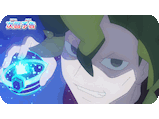
090



Main
Old Updates Archive
Links
 |
Lists |
List of Pokemon
Pokemon World Atlas
List of Techniques
List
of Items
List of TV Episodes
 |
Guides |
Episode
Comparisons
Movies
& Specials Guide
CD Guide
DVD Guide
Voice
Actors Guide
Lyrics Archive
Manga Guide
Video Games
 |
Miscellaneous |
Humor
Pokemon Bashing
Features
Rants
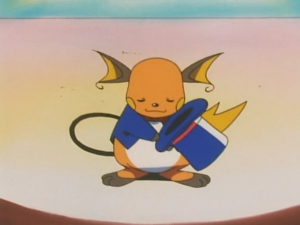
Episode Stats:
Japanese Episode 090: "Dance! Pokémon Showboat!"
American Episode ???: "Stage Fight!"
Pokemon Dare Da? Raichu (Japanese), Golduck (English)
Dr. Ookido's Pokémon Course: Butterfree
Japanese Air Date: April 1st, 1999
American Air Date: February 12th, 2000
Important People: John / Jean (Roger), Kei (Kay), Kouji (Len), Anne (Anne)
Come one, come
all to the Pokémon Showboat, a traveling theater troupe that has
a group of Pokémon act out stage plays while a group of human
actors provide their voices from backstage! Satoshi and his friends
decide to hitch a ride on one of these boats to their next destination.
They’re hanging around the deck when they learn of Kei, a young actress
in the troupe whose Raichu appears to be too jittery to do what its
Trainer wants. The troupe leader sees how close Satoshi is to his
Pikachu and asks him if he can help give her some pointers. Eventually,
our heroes learn that Kei’s Raichu isn’t scared of its Trainer; it’s
the Trainer who’s afraid of the Pokémon! But how can Kei get
over her fears? Suddenly, the Rocket trio attack the boat and threaten
to blow it up if all the Pokémon onboard aren’t handed over
immediately. The theater troupe quickly gives in. The Rocket trio is
admiring their new Pokémon when Kei and the others appear from
backstage and convince their Pokémon to fight back. A battle
breaks out during which both Kei and Raichu are able to get over their
nerves and work together to defeat the trio of intruders. Later, Kei
and Raichu’s relationship has gotten so good that the two of them are
able to perform in the troupe’s very next performance! The
Pokémon Showboat continues its tour as our heroes look forward
to their next adventure in the Orange Islands.
Thoughts
Every now and then we'll get an episode of Pocket Monsters in which the characters-of-the day move the story along, all by themselves, while Satoshi and his friends just sort of stand in the background and watch. The Orange Islands episode "Dance! Pokémon Showboat!" is a fantastic example of this. It's a story about a group of actors working on a showboat who are in a bit of a pickle because one of its star Pokémon, a Raichu, has a terrible case of stage fright. Before they can help it get over these issues, however, the boat is attacked by the Rocket-Dan! The actors fight back using the wide variety of fighting fit Pokémon they happen to have on hand, all while the Raichu with stage fright has a heart-to-heart with its Trainer. The would-be thieves are sent packing and everyone, more or less, lives happily ever after.
Oh, and Satoshi and his friends are there, too!
If you think about it, what would have changed if Satoshi, Kasumi, and Kenji weren't onboard that particular day? The Rocket trio would still have attacked the showboat (their goal was to steal the theater troupe's Pokémon, not Satoshi's Pikachu), the actors would have still stood up for themselves and fought off the bad guys, the conflict introduced by the thieves would have still forced Kei to get over her fear of her Raichu, and the Rocket trio would have still been sent blasting off. Satoshi and Kenji join the fight a little bit, sure, but their role is pretty negligible when all is said and done.
And that's fine, I guess. It's nice to get an episode every now and then that shows us that the entire Pokémon World does not revolve around what some ten-year-old boy and his Pikachu are doing, that there are some people out there who can actually stand up for themselves when push comes to shove. It doesn't make for the most exciting episode ever (I found this one to be kind of boring if I'm being completely honest) but you can't argue that it isn't at least trying to shake things up a bit.
Something else this episode does that I find pretty neat is show us a Pokémon having issues because its Trainer is afraid of it instead of the other way around. That's new, right? I mean, look, if Pokémon were real then I feel like we'd all spend a large portion of our days being scared senseless of these little monsters who could literally kill us with a mere thought. If I was Kei then I'd probably be afraid too! The episode never goes too deep into the issue -- as mentioned in my previous comparison issues like humans having a healthy fear of Pokémon and their ability to effortlessly kill them is one of those topics this show is just not interested in delving into -- but it at least does enough to let us know that yes, this is a thing that happens sometimes.
Speaking of electrical attacks, something that strikes me about Kei's Raichu's in particular is how the animation goes all dim and jerky whenever it lets sparks fly, as if this was an early Kanto episode or something. Which, at this point in the series, is really, really odd. "Dance! Pokémon Showboat!" would have gone into production well after the Pokémon Shock incident and the new guidelines introduced as a result and so why are we still having to put up with the two-frames-a-second edits like the ones we see in this episode? Did someone just not get the memo or what?
The English version of this episode was de-existed in 2016 but I'll get more into that in a minute. Adaptation-wise, this episode's scripts is one of the better ones of the season as it has fewer rewrites than most. Unfortunately, the dub kind of undoes this very good thing by forcing its voice actors to give the Pokémon these dumb little cartoon voices whenever they're performing on-stage. In the Japanese version Ken'ichi Ogata more or less uses his normal speaking voice for both John (the leader of the theater troupe) and Ebiwalar (the Pokémon voice that John dubs over). But for the English dub, Maddie Blaustein puts on a goofy cartoon voice for Roger (most likely to distinguish this guy from the 100s of other characters she'll play throughout her tenure on the show) and then an even goofier cartoon voice for Hitmonchan, because apparently giving Pokémon normal voices is forbidden over at 4Kids Entertainment. The English dub of this show has always had an issue with using what I call "dumb cartoon voices" but this episode kind of takes it up another level.
Raichu keeps its Japanese
voice.
Side
Note -- This episode's "banning" in the West
I'm sure most of you already know this by now but
as far as TPCi is concerned this episode no longer exists. I don't know
the exact date it was de-listed but it was sometime around 2015 or so
when this
episode, along
with "Holiday Hi-Jynx" and "The
Mandarin Island Miss Match,"
just up and vanished from
Pokemon.com, streaming services, and home video
re-releases.
For example, here's a
snapshot taken
in March 2014 of the Season
2 page (with the HTML edited to turn off the site's lazy loader) of
the Pokémon
the Series Episode Encyclopedia section on Pokémon.com.
If
you click on the image below you'll see that the episode "Stage
Fight!" is listed as the 37th episode of Season 2.
 |
And here is that same
page today.
"Holiday Hi-Jynx!," "Stage Fight!," and "The Mandarin Island
Miss Match" have all been removed, and the numbering of the other
episodes in the season have all been shifted over to cover up the gaps
created by said removals. "Bye
Bye Psyduck," for example, went from being listed as Episode 38 (2014)
to
being listed as Episode 36 (today).
 |
The same thing happened
with Viz's DVD releases for the series. On the left is the Episode
Selection menu from the 2002 single release, Pokémon Adventures On The Orange
Islands I. On the right is the 2015 re-release, Pokémon Adventures in the Orange
Islands: The Complete Collection. If you enlarge the images
you can see the listing for "Stage Fight!" on the eastern most island
there has been removed from the 2015 version. Special thanks to mbc
over on Twitter for the screenshot of the newer DVD release.
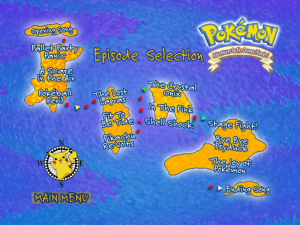 |
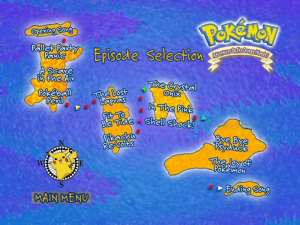 |
No official reason was
ever given for the episode's removal but most people assume it's
because if features the blackface Pokémon Jynx.
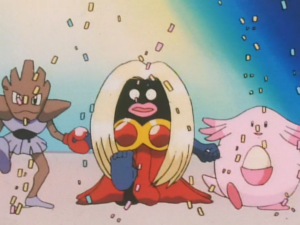
So here's the thing.
Jynx is a problem, no doubt about it. And an episode set on a showboat
-- which helped popularize minstrel shows back in the day -- that just
happens to have the
blackface Pokémon onboard is just a whole other layer of
problematic. They couldn't possibly leave the episode in rotation as-is.
But if
there was ever an episode featuring
Jynx that could have been salvaged then this was it. I did the math and
Jynx's
screentime in "Stage Fight!" comes to a grand total of 38 seconds (and
that's with me being very generous with the definition of
"screentime"). It's a background character in pretty much every
sense of the word and could have therefore been excised with very
little effort. All TPCi would have had to do is remove all its
scenes and then make a few music edits to cover up the skips in the
soundtrack and BOOM - you've got an episode of Pokémon that
still makes perfect sense without
any unfortunate racist stereotypes from the original. That requires a
little more effort
than the 0% TPCi is willing to expend to salvage older episodes,
however, so they
just removed it entirely and called it a day.
Oddly enough, this is one
of the very few pieces of Pocket
Monsters animation featuring the black faced Rougela where OLM
hasn't gone back
and recolored
the Human Shape Pokémon. It's a very odd, but conspicuous,
omission.
This episode existed for
a good decade and a half before TPCi decided to finally give it the
boot so
if you want to watch it there are quite a few home video releases
available on the second hand market if you're so inclined.
As I alluded to earlier, the script in this episode is actually pretty decent, all things considered! A lot of the "Dialogue Edits" are going to be fairly nitpicky because otherwise I'd have nothing to talk about.
Our heroes decide to take in a show:
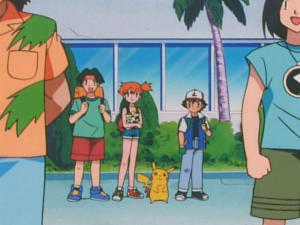
| Japanese
(original) |
Japanese
(translated) |
English
Dub |
| ケンジ 「ポケモンのショーか?どうなんだろうな?」 |
Kenji:
"A Pokémon Show, huh? I wonder what that's like." |
Tracey: "I've heard about
these showboats but I've never been on one." |
| カスミ 「行ってみましょうよ!」 |
Kasumi: "Let's go find out!" |
Misty: "Why don't we go, Ash?" |
Tracey has apparently heard of these "Pokémon Showboats" before while Kenji has not.
The show gets started:

| Japanese
(original) |
Japanese
(translated) |
English
Dub |
| エビワラー 「オレは勝つ。愛するピクシーのためにもオレは…必ず勝つ!」 |
Ebiwalar:
"I have to win. For my dear Pixy...I have to win!" |
Hitmonchan: "I can't walk away. I've got to stand right here and fight, or I'd...I'd never forgive myself." |
| ピクシー 「お願いエビワラー、もう…もうやまて。」 |
Pixy: "Please, Ebiwalar, I'm
begging you...just give up already!" |
Clefable: "No matter what happens, I'll *sniff* be right here." |
Yeah, I have no idea why 4Kids decided to do a random rewrite here. Is fighting for the love of a mutant fairy thing not "cool" enough for American kids or something?
Side Note
This boxing scene that starts off this episode is an homage to one of the most famous scenes in all of Japanese animation, the Ashita no Joe cross punch.
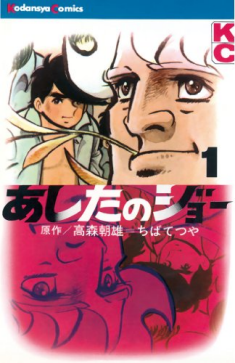
Ashita no Joe (あしたのジョー), commonly released in the U.S. as Tomorrow's Joe, is a manga-turned-anime from the 1970s that follows a young delinquent named Joe Yabuki as he gets thrown in juvie, gets into boxing, becomes rivals with fellow inmate Toru Rikiishi, eventually gets released, and then goes on to become a professional boxer.
Ashita no Joe is considered to be one of the most influential animated series in Japanese history. A lot of the visual language used by Japanese animation -- showing the same action three times in a row for emphasis, having the animation freeze for a moment and then turn into a stylized sketch, glitter vomit -- all got its start with this series. Mike Toole wrote this great article on Anime News Network explaining just how big a deal this show is to Japanese audience; do yourself a favor and read through it when you get a chance.
The "cross counter" scene in question is from the end of Tomorrow's Joe Episode 14, "Is it Time for the KO Gong Yet!?" Joe isn't doing so great in his match against his rival Toru and so he decides to use the risky "cross counter" technique to bring the fight to an end. In the Pocket Monsters version of the scene, Ebiwalar and Goriky perform the "Cross Counter" in what is basically a shot-by-shot remake (albeit slightly out of order) of the famous scene from the 1970 anime. Ebiwalar yelling out "Cross Counter" (クロスカウンター!) right before the attack removes absolutely any doubt of what it is they're parodying here.
 |
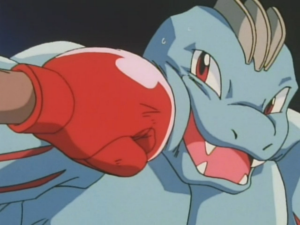 |
 |
 |
 |
 |
If you're thinking "waitaminute...I feel like I've seen this exact scene in a ton of other anime before" then that's because you probably have. Homages to this one scene in particular have appeared in literally dozens and dozens of anime over the last 50 years and parodies of this particular scene are about as ubiquitous as, say, the countless number of "bullet time" homages that've come out in the years since The Matrix. In fact, this isn't even the last time we'll see Pokémon pay tribute to this scene; a very similar homage can be seen in Pocket Monsters Advanced Generation Episode 082, "The Forest's Fighting King!? Wakashamo vs. Kinogassa!!"
Anyway, it's kind of neat seeing 4Kids leave this scene uncut since showing two characters punching each other in the face is something they'll definitely be more skiddish about in future seasons.
Dialogue Edit
The characters in the Japanese version only ever refer to the leader of the theater troupe as zachou (座長), a handy little term that means "leader of the theater troupe." We don't really have an equivalent to that term in English; "Mr. Director" could work, maybe, but it doesn't quite convey the same meaning.
This zachou guy does actually have a name, but it's different depending on where you look. The end credits of the episode list him as "Jon / John" (ジョン) so that seems like that should be the end of it, but then the text that accompanies the character design sheets printed in the back of The Memorial Book of Orange Islands curiously list his name as "Jean" (ジャ ン) instead. So which one is it? I guess it's up to you to decide!
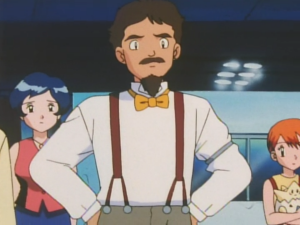 |
 |
 |
The English dub decides to not bother with any of this and just renames the guy "Roger" instead *shrugs*
Team Rocket hatches a plot:
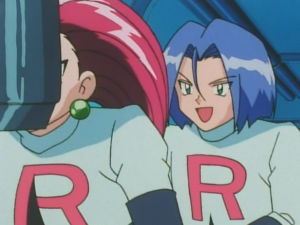
| Japanese
(original) |
Japanese
(translated) |
English
Dub |
| ムサシ 「みーつけたみつけた!あのショーボートに乗っているポケモンたちを全
部まとめていただちゃえば」 |
Musashi: "Lookee what I found!
If we scoop up all the Pokémon aboard that showboat..." |
Jessie: "Ha ha ha ha! That
showboat is packed with performing Pokémon, and all we have to
do is get onboard and snatch them." |
| コジロウ 「憧れのビロードウェイでミュージカルが出来て…」 |
Kojirou: "Then we'll be able
to open a musical on the famous Veludway..." |
James: "Our dream of a Team
Rocket dinner theater can come true!" |
| ニャース
「主役はニャ―にゃん!」 |
Nyarth: "I call dibs on being
the star Nya!" |
Meowth: "I'll be the star!" |
In the Japanese version Kojirou mentions a dream of being on "Veludway" (ビロードウェイ), a made up place whose name comes from taking the first syllable of the Japanese word for Broadway (ブロードウェイ), "bu," and replacing it with a "bi" (ビ) instead. This turns buroodo into biroodo, which we can then transliterate back as "veludo," or "velvet."
The English dub goes with a generic term "dinner theater" instead.
Meowth, after he's been savagely beaten by Jessie:

| Japanese
(original) |
Japanese
(translated) |
English
Dub |
| ニャース 「ミュージカルをやると言ったのコジロウだニャ」 |
Meowth: "But Kojirou's the one
who said to do a musical..." |
Meowth: "I think we ought to
work on our choreography." |
Nyarth pointing out that it's actually Kojirou who made the suggestion that got him beaten up is the kind of dark humor this show likes to do from time to time. But I guess 4Kids didn't like it?
Kay recites a poem:

| Japanese
(original) |
Japanese
(translated) |
English
Dub |
| ケイ 「野原を渡る風よ、大空を泳ぐ雲よ、君たちはどこから来た
んだい?大自然の息吹に抱かれて、僕はここにいる。緑の森よ、青い海よ」 |
Kei: "O wind that goes through
the grassy fields, and clouds swimming through the great blue sky, from
where did you come? Hugged by the breath of Mother Nature, I am here. O
green forests, O blue seas..." |
Kay: "It is an ancient Mariner, and he stoppeth one of three. The bridegroom's doors are open wide, and I am next of kin. The guests are met, the feast is set, mayest hear the merry din." |
Kay is reciting (a truncated version of) The Rime of the Ancient Mariner by Samuel Taylor Coleridge in the English dub. Which is kind of cool, I guess; having characters in a Kids' WB! show recite real world poetry is something you just don't see everyday!
As for the Japanese version, I searched and searched and searched online but couldn't come up with the source. The poem she recites in the original is not the Japanese translation of The Rime of the Ancient Mariner, and it doesn't seem to be a poem written by anyone else either. I had no idea what this was.
But we live in a magical age of social media, where you can just go up to the screenwriter of a nearly 25-year old episode of a kids' cartoon and be like "hey, what was this?" And so that's exactly what I did! I messaged Mr. Sonoda about Kei's poem a few weeks before posting this comparison and he actually responded (!!!), telling me that he couldn't really remember where it came from since it was so long ago but that he doesn't believe that this is a piece of literature that had ever existed before. So maybe he's the one who wrote it...?
Again, we're talking about memories of a single episode of a TV show from a quarter of a century ago. But, assuming Mr. Sonoda's memory here is accurate, we can sum this all up by saying that a (probably) original poem by Mr. Hideki Sonoda in the Japanese version got changed to The Rime of the Ancient Mariner for the English dub.
Music Edit
Speaking of Kay's poem, the English dub also does something really curious here in regards to the music. The scene inside the theater -- the one right after the Rocket trio scene -- starts off by using the song 1997~1998 M10 "Pikachu Appears" as its background music. This music is used in both the Japanese version and the English version, so there's no problem there.
Well, in the original version the music plays until all the way after Kei finishes reciting her poem but the English dub, for some reason, decides to cut the music short. As soon as Kay starts speaking the music stops, and she recites her entire poem in complete silence.
It's a really puzzling change that is very much out-of-character for a company that usually strives to have wall-to-wall music in all its shows, wouldn't you say?
Dialogue Edit
Outside, Kay tells Ash what's going on between her and Raichu:
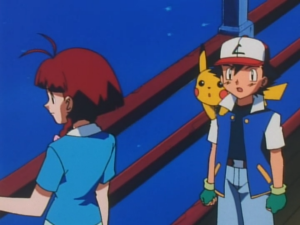
| Japanese
(original) |
Japanese
(translated) |
English
Dub |
| ケイ 「あの時から私…今でも心のどこかでライチュウの電撃をこわがって。それ
がライチュウにもわかって、臆病にさせてるんだわ」 |
Kei: "Ever since then...well,
even now I'm afraid of Raichu's electricity. Raichu can sense that and
then that, in turn, makes it nervous." |
Kay: "Ever since then, I've always been afraid of being shocked by Raichu like on the day we met. And that makes Raichu nervous because it can tell how afraid I am." |
| サトシ 「ケイはライチュウのこと、嫌いなの?」 |
Satoshi: "So you're saying you don't like Raichu?" | Ash: "Do you still wanna be Raichu's Trainer?" |
| ケイ 「そんな!私、ライチュウが大好きよ!」 |
Kei: "Of course not! I love my
Raichu!" |
Kay: "Of course I do! I'd do anything for my Raichu." |
| サトシ 「だったら大丈夫!ケイの気持ち、ライチュウもわかってくれるさ」 |
Satoshi: "Then it'll all work
out. Raichu'll understand how you feel, Kei." |
Ash: "Then it'll all work out. Raichu'll see how you feel sooner or later." |
| ピカチュウ 「ピカピカ」 |
Pikachu: "Pika Pika." |
Pikachu: "Pika Pika." |
A small difference, but one I felt was worth bringing up; Satoshi's question to Kei is different depending on what version of the show you're watching.
Misty, Tracey, and Roger
all respond to the above:

| Japanese
(original) |
Japanese
(translated) |
English
Dub |
| カスミ 「サトシったら楽天的なんだから」 |
Kasumi: "That Satoshi always
looks on the bright side." |
Misty: "Sometimes Ash knows just the right thing to say." |
| ケンジ 「ポケモンとの付き合いは、シンプルイズベストってことかな」 |
Kenji: "I guess this is what
they mean when they say 'simple is best' when making friends with
Pokémon." |
Tracey: "I guess it's easy to say the right thing as long as you say it from your heart." |
| ジョン 「ああ、きっとそうなんだよ」 |
John: "Yeah, I think you're
right." |
Roger: "Yes, the heart always tells the truth." |
This whole heart of the
cards type speech is, you guessed it, a 4Kids rewrite.
Also why is the adult
leader of this acting troupe sneaking around a boat with a bunch of
pre-teens? Should we be worried for them or...?
Team Rocket attacks:

| Japanese
(original) |
Japanese
(translated) |
English
Dub |
| ムサシ 「目標捕捉」 |
Musashi: "Target acquired!" |
Jessie: "Target locked! Speed?" |
| ニャース 「ニャ―し!」 |
Nyarth: "Ny'alright!" |
Meowth: "Steady!" |
| コジロウ 「コイキング魚雷…」 |
Kojirou: "Koiking Torpedo..." |
James: "Torpedo ready." |
| ムサシ 「…発射!」 |
Musashi: "Fire!" |
Jessie: "Fire!" |
The Koiking torpedo
doesn't get a name in the English dub.
Eyecatch
Look at that little Raichu in its little tuxedo!!
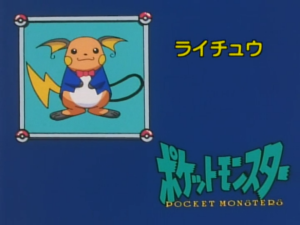 |
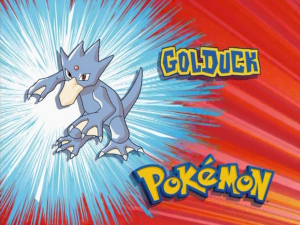 |
But, y'know, stock artwork of a Golduck's just as awesome *rolls eyes*
Side Note
Kay comforts Raichu:

| Japanese
(original) |
Japanese
(translated) |
English
Dub |
| ケイ 「大丈夫。大丈夫よ、ライチュウ」 |
Kei: "It's OK. It's OK,
Raichu." |
Kay:
"It's OK, Raichu. I'm not afraid anymore." |
| ライチュウ 「ライ?」 |
Raichu: "Rai?" |
Raichu: "Rai?" |
| ケイ 「ライチュウ、大丈夫?」 |
Kei: "Raichu, are you alright?" |
Kay: "Raichu, are you alright
now?" |
| ライチュウ 「ライ」 |
Raichu: "Rai." |
Raichu: "Rai" |
So, not to get all nakama on you or anything, but daijoubu (大丈夫) is one of those words
that can mean a ton of different things depending on the context. It
can mean "it's OK" (present tense), "everything's going to be fine"
(future tense), "no thank you" (when refusing something), "that works
for me," and literally dozens and dozens of other phrases. The English
phrase "OK" is similarly very versatile but daijoubu kind of kicks it up a
notch.
In the Japanese version
of this exchange, Kei uses the word daijoubu
three times. The first time, 4Kids goes with "It's OK, Raichu." The
second time, they have Kay say "I'm not afraid anymore" because, well,
an argument can be made that that's what she's really trying to tell her
Pokémon in the original. The Japanese language can be vague like
that sometimes! The third one's "Raichu, are you
alright now?"
The same thing happens
later in the episode when Kay and Raichu do more or less the same thing
during the Team Rocket battle.
I'm not bringing this up
because I think it's a rewrite or anything; I'm just bringing it up
because I think it's an interesting case study at how you can sometimes
translate the same word a bunch of different ways depending on the
context.
Team Rocket makes their threats:

| Japanese
(original) |
Japanese
(translated) |
English
Dub |
| ムサシ 「このショーボートは、あたしたちロケット団がのっとった!」 |
Musashi: "The Rocket-Dan has
taken control of this showboat!" |
Jessie: "Now that Team
Rocket's on board, we're the stars of this little showboat." |
| コジロウ 「なぜなら、船のあっちこっちに爆弾を仕掛けたからだ」 |
Kojirou: "That's because we've
planted bombs all over the ship." |
James: "And don't try to upstage us or you'll be in for a little surprise." |
| ニャース 「いう事を聞かないとこの船は…ドカーンニャ!」 |
Nyarth: "If you don't do what
we say then we'll make this whole boat go KABOOM Nya." |
Meowth: "Stick to our script or this show'll bomb. Haha!" |
| サトシ 「そんな脅しに誰が乗るか?」 |
Satoshi: "And who in the world
is gonna believe a story like that?" |
Ash: "If you think that scares
me, think again!" |
In one of the few
outright rewrites of the episode, the Rocket trio say they have bombs
planted all over the ship only to have Satoshi call their bluff. Meowth
sorta-kinda implies this (plus, he's standing in front of a dynamite
plunger and all, so...) but the trio doesn't mention anything in the
English dub about having
hidden the explosives all over the ship.
The leader of the theater
troupe isn't taking any chances, though:

| Japanese
(original) |
Japanese
(translated) |
English
Dub |
| ジョン 「待ってくれサトシくん」 |
John: "Wait a minute please,
Satoshi-kun." |
Roger: "Ash, do as they say." |
| サトシ 「あ?」 |
Satoshi: "Huh?" |
Ash: "Huh?" |
| ジョン 「この船は私たちの命と同じくらい大切なものだ。それを失う訳にはいけ
ない」 |
John: "This boat is as
precious to us as our very lives. We can't risk losing it." |
Roger: "This showboat is
everything to us. It's our livelihood and it's our home. We just can't
afford to put it in jeopardy." |
The English dub has Roger
indicate that this group of traveling performers actually live on this boat when no such
thing is even implied in the original.
Side
Note
When Meowth yells at Raichu to "knock it off!" you can very clearly
hear the audio from the Japanese version (naku nya-! (泣くニャ!), or "Quit your
blubbering Nya!") in the background.

Dialogue Edit
The characters-of-the-day stand up for themselves:

| Japanese
(original) |
Japanese
(translated) |
English
Dub |
| "エビワラー" 「よし!みんなで力を合わせて戦おう!」 |
”Ebiwalar": "OK! Let's all
work together and fight back!" |
"Hitmonchan": "Friends, let's
show these pirates they can't invade our vessel." |
| "ピクシー" 「自由のために」 |
"Pixy": "For freedom..." |
"Mr. Mime": "Make them walk
the plank!" |
| "バリヤード” 「平和のために…」 |
"Barrierd": "And for peace..." |
|
| みんな
「おぉ!」 |
Everyone: "Let's go!" |
Everyone: (screams) |
The Japanese version has all the Pokémon giving a stereotypical hero's speech while the English dub has everyone call out for the Rocket trio's murder instead!
Music Edit
The song that plays during the stage show at the very end of the Japanese version of this episode is Mezase Pokémon Master but the English dub replaces it with Pokémon World.

I'm guessing 4Kids didn't have a full version of their song ready at this point in the season (their dub of the second movie wouldn't be out for another half a year or so) because when you listen to it you'll notice large chunks of the song where nobody's singing. Were the lyrics to the full version just not written yet...?
Dialogue
Edit
Ash tries his hand at voice acting:

| Japanese
(original) |
Japanese
(translated) |
English
Dub |
| サトシ 「ケイ、お芝居って楽しいね」 |
Satoshi: "Kei, doing theater
is a lot of fun." |
Ash: "It's kind of hard to match the lip flaps, isn't it?" |
| ケイ
「ありがとう、サトシくん」 |
Kei: "I'm happy to hear it,
Satoshi-kun." |
Kay: "You're doing just fine." |
A character in a 4Kids
production is trying his hand at voice acting so of course the writer's going to
throw a
dubbing reference in there.
Originally Satoshi just
comments on how fun acting is.
| Previous Episode |
This page was last updated on October 25th, 2021
Found an error or omission? Please help me keep this page current and error-free by e-mailing me with a description of the issue.

